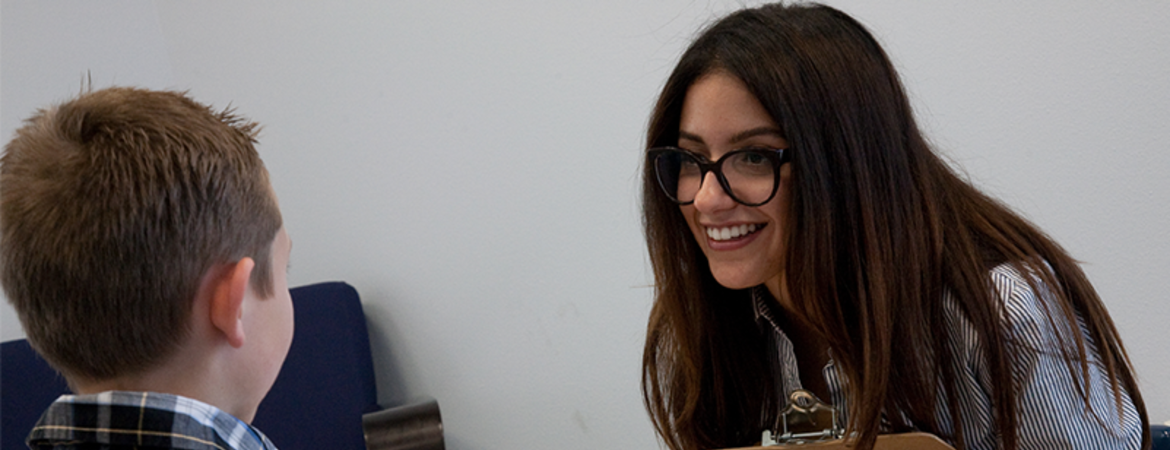
When Yasamine Bolourian decided to pursue a Ph.D., she wanted to commit to a program that “prepared students to be highly-competent leaders in their field,” and in her case, engage in cutting-edge research in special education and autism. After learning that UCR was home to some of the nation’s leading experts in autism research and the highly regarded SEARCH Family Autism Resource Center, GSOE quickly became Yasamine’s top choice. Now, three years into her Special Education doctorate, she has been trained in gold standard autism assessments at SEARCH, has co-authored on several studies, and presented research with GSOE’s Dr. Jan Blacher, Distinguished Professor and director of SEARCH, and SEARCH assistant director, Dr. Katherine Stavropoulos.
Tell us about your experience as a graduate student researcher at SEARCH Family Autism Resource Center, and some of the projects the center has been working on? SEARCH is truly unique as it is the UC-system’s first no-cost screening clinic for individuals suspected of having autism. Since day one, I wanted to be actively engaged in practice at the clinic. As part of the SEARCH team under Dr. Blacher’s supervision, I have had various educational and clinical opportunities, working closely with children and families from diverse backgrounds. It has been particularly inspiring to interact with families during a very critical period in their lives and, consequently, continue to cultivate empathy and become more attuned to their lived experiences.
More recently, we have embarked on new projects and collaborations that have expanded our reach. SEARCH and the UCR School of Medicine have partnered to improve access to care and receipt of services for underserved minority families in the community, and we have had an integral addition to the SEARCH team, Dr. Katherine Stavropoulos. Among other notable titles, Dr. Stavropoulos is an assistant professor at the GSOE and a clinical psychologist, who brings invaluable insight and perspective into the additional co-occurring issues that children in this population face. Training under her wing has vastly broadened my content knowledge in the field of autism spectrum disorder (ASD).
What drew you to the field of special education? I was drawn to special education because of the desire to enhance the quality of life for students with autism and other special needs, as well as their families. These populations have well-documented substantial academic, social, and behavioral challenges that require attention in both the home and school environments.
Tell us a little about your own research interests, and what you are currently working on? My research focuses on understanding the social and emotional development of youth with developmental disabilities, specializing in autism spectrum disorder. Social-emotional issues in children with autism are frequently reported by both parents and teachers, and therefore permeate home and school systems. My research explores the manifestation of these issues (e.g., social deficits, anxiety, behavioral problems) in order to help researchers, families, and educators understand the difficulties experienced by youth with autism.
While the bulk of my research has been focused on children with ASD, I envision an increase in research attention on adults, a population that has been relatively neglected in the field. In line with this, I am interested in understanding and supporting students with autism in the postsecondary setting. I have been fortunate to engage in research with Dr. Blacher at the GSOE that investigates the experiences of university students with autism and ADHD, as well as faculty knowledge about developmental disabilities, through a project entitled “Autism 101.”
What have been some of the highlights of being a graduate student at UCR? One of the many highlights of being a graduate student at UCR has been receiving mentorship and collaborating with faculty across the GSOE. In particular, I have had the opportunity to work with Dr. Keith Widaman, Dr. Marsha Ing, and Dr. Robert Ream on a variety of projects that have greatly added value to my graduate research and training experiences.
What advice would you give an incoming graduate student? “It takes a village to raise a graduate student:” My advice to incoming students is to take full advantage of UCR’s exceptional resources and faculty. For instance, the Graduate Division offers a wide array of resources to meet student needs. Early on, I participated in the Graduate Student Mentorship Program, as well as utilized group workshops and individual consultations offered at Grad Quant and the Writing Center. These programs have been tremendously helpful in answering questions related to coursework, personal research, and general graduate school survival skills. More recently, I have been making use of Dissertation Occasion, which provides students who are working on their dissertation with the space and time (and coffee!) for dedicated writing hours.
Best advice someone has given you as a graduate student? Don’t forget about self-care! For me, I try to see my friends and family as much as possible, and exercise – sort of…